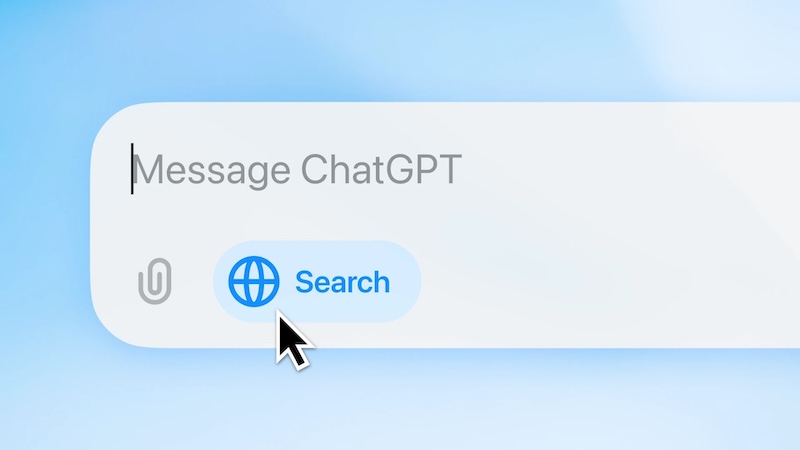
In July 2024, OpenAI announced its own AI search engine. Now ChatGPT Search is officially available. We will explain to you how the search engine works.
ChatGPT is now officially a search engine too. OpenAI had already announced a corresponding function in July 2024. Initially, ChatGPT Search only existed as a prototype. Access was limited to a maximum of 10,000 users. Now OpenAI has made the AI search engine available to all subscribers to the ChatGPT Plus paid subscription.
“Get quick, timely answers with links to relevant web sources”: This is how OpenAI promotes its new AI search engine in the official announcement. ChatGPT should now be able to search the Internet better than before.
How does ChatGPT Search work?
The AI search model is a fine-tuned version of GPT-40 that has been retrained using novel techniques to generate synthetic data. According to OpenAI, ChatGPT Search “combines the benefits of a natural language interface with the value of current sports scores, news, stock prices and more.”
The AI continues to search the internet based on user input. The search can also be started manually – by clicking on the search button. ChatGPT Search should be usable on iOS, Android as well as desktop apps for macOS and Windows.
In the future, the GPTChat language model will also contain links to sources – for example, news articles and blog posts. This is intended to enable users to find out more about a topic. By clicking on the “Sources” button under an answer, a sidebar with the sources can be opened.
OpenAI works with Axel Springer and Condé Nast
To ensure access to relevant information and new visual designs, the company has partnered with news and data providers including the Associated Press, Condé Nast, Financial Times, Reuters, Le Monde and the Axel Springer publishing house.
This also seems necessary because many AI search services are currently facing lawsuits. So have News Corp and the New York Times for example, filed a lawsuit against the AI search engine Perplexity AI. The allegations include, among other things, copyright infringement. Meanwhile, partnerships are intended to prevent legal disputes.
OpenAI wants to further expand ChatGPT Search
OpenAI plans to further expand ChatGPT Search in the future. The company wants to focus primarily on the areas of shopping and travel. The search function should also be able to use logical capabilities of the OpenAI o1 series to carry out more in-depth research.
Currently only ChatGPT Plus and Team users have access to the new AI search engine. This also applies to everyone who is on the SearchGPT waiting list. In the future, approval for companies and educational institutions will also follow. In the coming months it is planned that all users of the free version will also have access to ChatGPT Search.
The launch of the AI search engine comes at a time when AI-powered search has already gained momentum at other major tech companies. OpenAI thus closes a competitive gap with competitors such as Google Gemini and Microsoft Copilot. They have long had real-time Internet access in their AI conversations. Meta also developed Report according to its own AI search solution. Google has now expanded its AI overview function to more than 100 countries expanded.
Also interesting:
- With ECG data: This AI should be able to predict death
- SynthID: Are watermarks a solution to detect AI content?
- AI search engine: What is Perplexity AI?
- Illegal products? EU Commission initiates proceedings against Temu
The post ChatGPT Search: This is how you can use the OpenAI search engine by Beatrice Bode first appeared on BASIC thinking. Follow us too Facebook, Twitter and Instagram.
As a Tech Industry expert, I believe that ChatGPT Search has the potential to revolutionize the way we search for information online. By leveraging the power of OpenAI’s language models, ChatGPT Search is able to understand natural language queries and provide more accurate and relevant search results.
One of the key advantages of ChatGPT Search is its ability to understand context and contextually relevant information, making it easier for users to find the information they are looking for. This can be particularly useful for complex or nuanced queries that traditional search engines may struggle to understand.
Additionally, ChatGPT Search has the potential to improve over time as it learns from user interactions and feedback. This means that the search engine will become more accurate and efficient as it continues to be used.
Overall, I believe that ChatGPT Search has the potential to be a game-changer in the world of search engines, and I am excited to see how it will continue to evolve and improve in the future.
Credits